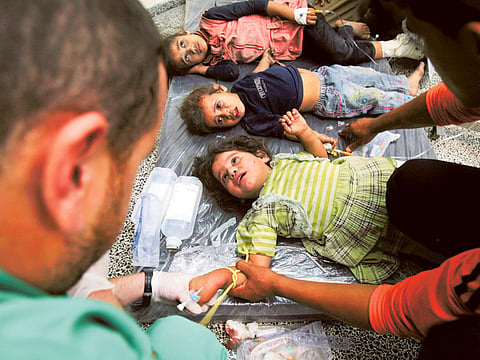Doctors heal minds damaged by destruction in Gaza
UN estimates 400,000 children need psychological care as a result of wars against Israel since 2006

Gaza City: In a ward at Shifa, Gaza’s largest hospital, child therapist Rabeea Hamouda is trying to elicit a response from two small brothers, Omar and Mohammad, aged three and 18 months, hoping for some words or perhaps a smile.
For seven straight minutes the children, peppered with burns and shrapnel wounds sustained in Israeli shelling that hit their home in north Gaza, stare at him blankly, emotionless.
Eventually, as Hamouda gently teases them, pretending to mix up their names and holding out a present while another counsellor sings quietly, a smile creeps across Mohammad’s face and the older one, Omar, cries out his name.
“At the beginning, Omar was not responding to us at all, he was not even willing to say his name,” explains Hamouda, who heads a team of 150 psychotherapists working for the Palestinian Centre for Democracy and Conflict Resolution in Gaza.
“Big progress has been made with these children,” he says with a sense of relief and quiet accomplishment. “At the beginning they did not talk, they refused to communicate. But now, with the sixth session, we are witnessing good progress.” Omar and Mohammad are just two of the 400,000 Gazan children the United Nations estimates are in need of psychological care as a result of not just the latest war in the territory but the three previous conflicts fought with Israel since 2006.
The most recent conflagration has been the deadliest, with more than 1,900 Palestinians killed, many of them civilians and including an estimated 457 children. On the other side of the border, some 64 Israeli soldiers and three civilians have been killed.
Whether the result of Israeli air strikes, having parents or relatives killed before their eyes, hearing rockets being fired from their own towns or themselves being wounded, the psychological trauma for Gaza’s young is profound.
The symptoms range from nightmares, bed-wetting and behavioural regression to more debilitating mental anxiety, including an inability to process or verbalise experiences.
There is also deep trauma on the other side of the border, with tens of thousands of Israeli children mentally disturbed by the regular rocket fire during the month-long war and over the seven years since Hamas seized control of Gaza.
While the conflict’s destruction of buildings and livelihoods is clear to see and documented daily in television footage, the damage to minds is mostly invisible, yet can have far more damaging and longer-lasting consequences.
“The first time a child goes through a traumatic event like a war it’s just deeply terrifying,” said Chris Gunness, the spokesman of the United Nations Relief and Works Agency, which has 200 psychotherapists working in up to 90 clinics in Gaza.
“The second time is terrifying-plus-one because the child remembers the worst parts of the last war as well as the impact of the current one. Then the third time is plus-plus as the compounded memories of conflict build up.
“This time, for an eight- or nine-year-old child in Gaza, it’s very, very intense indeed because there is this cumulative toll of trauma from repeated conflicts since 2006.”
Hamouda and his team, like other psychotherapy units working across the small territory - home to an estimated 1.8 million people, more than half of whom are aged under 18 — can barely cope with the number of patients requiring help.



